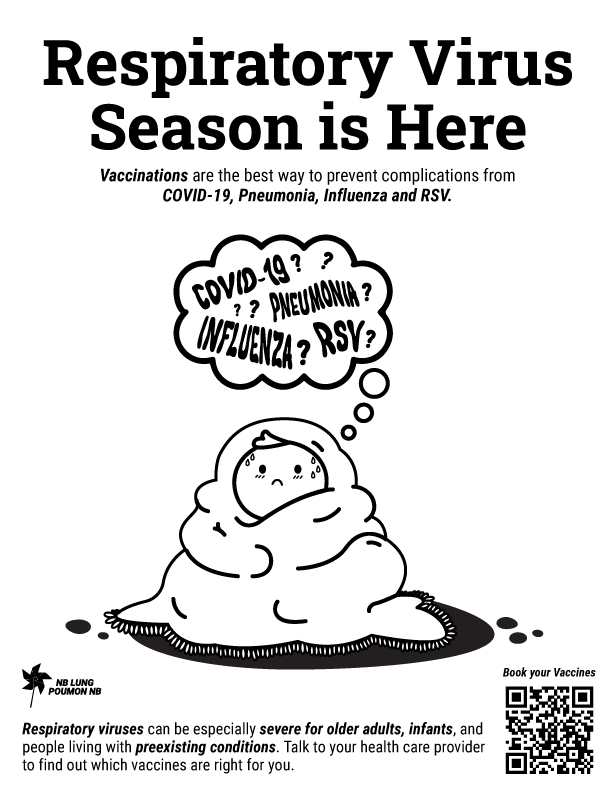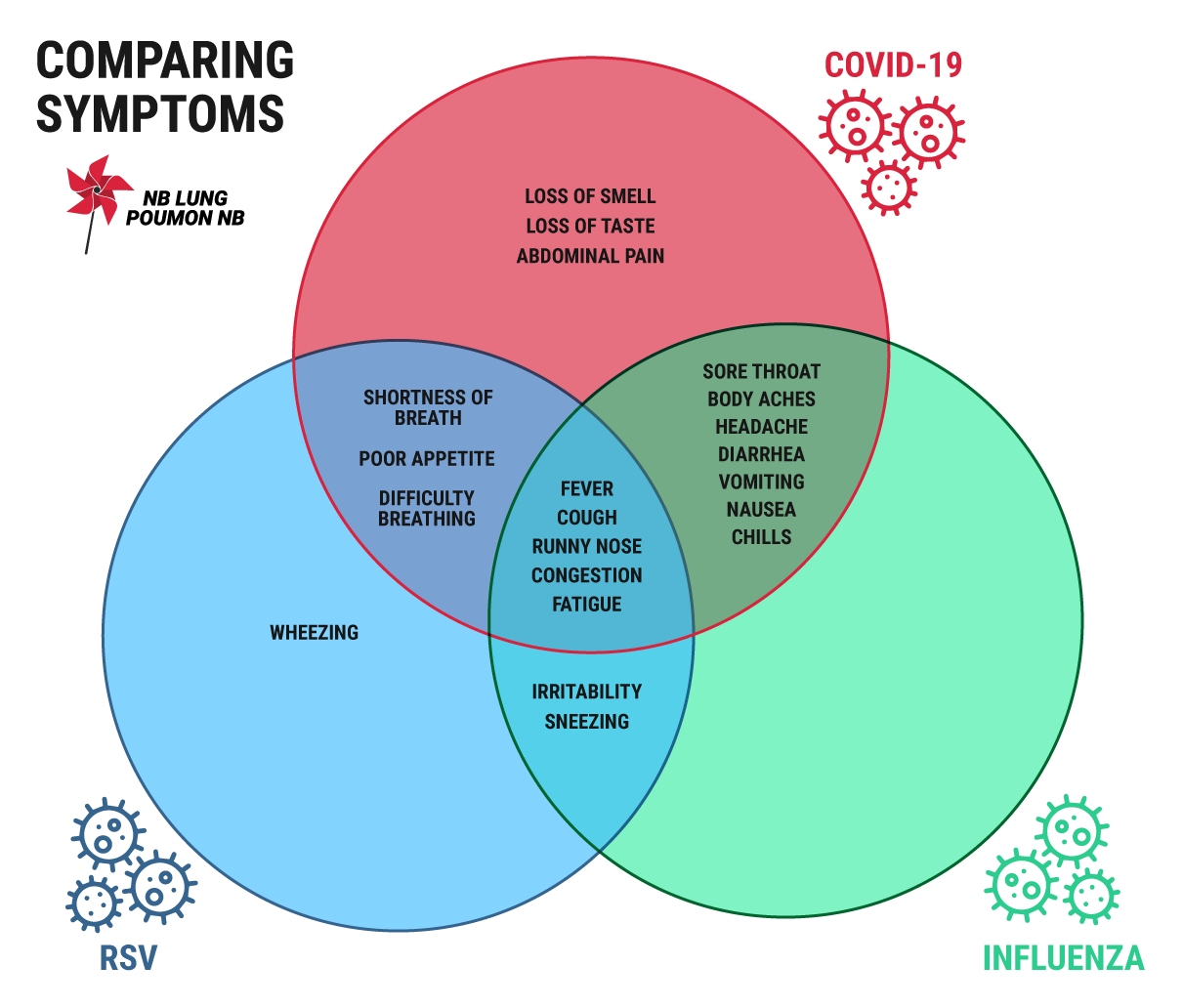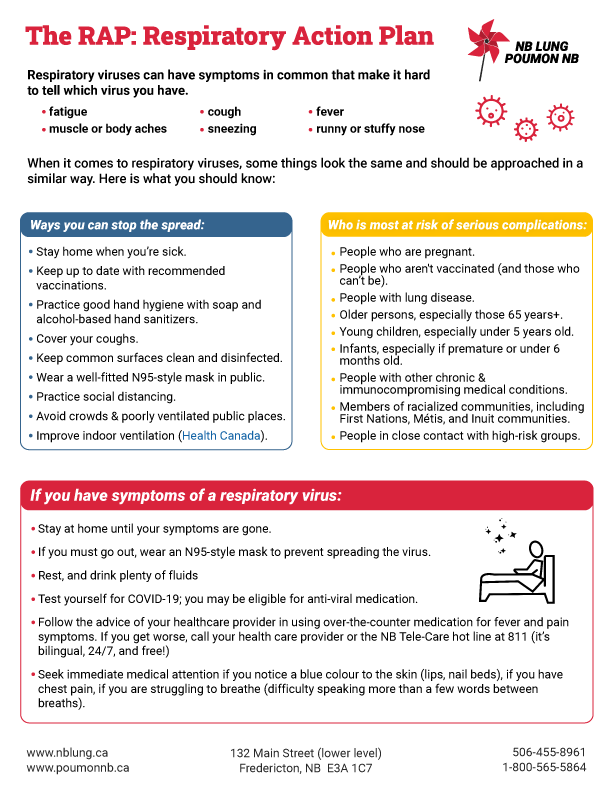Lung Health:
Respiratory Viruses
Did You Know?
Properly fitted respirator masks are an effective way to prevent the spread of respiratory viruses.
Downloadable Resources
(Click to enlarge)
(Click to enlarge)
(Click to enlarge)
Book Your Vaccines Today
COVID-19
What is COVID-19?
COVID-19 is an airborne viral infection illness caused by the SARS-CoV-2 virus. COVID-19 continues to be a concern in New Brunswick and as more data is gathered, we’re learning that even “mild” cases can have long-term impacts. New Brunswick 2023 statistics show that over 90% of deaths from COVID-19 are aged 65+.
Everyone can get COVID-19, but for some people it can be life-threatening. COVID-19 is easily spread, especially among vulnerable groups. It is transmitted from person to person through fine aerosols that remain suspended in the air, much like smoke lingers in poorly ventilated spaces. Generally, the incubation period with new strains is getting shorter; symptoms can begin to show as soon as 2 days after exposure, or as late as 14 days.
Rapid Testing
Rapid Antigen Tests (RAT) or Rapid Point of Care (POCT) tests, for Covid-19 whenever available, should be used when developing symptoms.
To check your eligibility and to book a Covid-19 vaccine (First or Booster), Click Here
A negative test result with symptoms of COVID-19 can still be COVID-19. The virus takes time to build up in your body, so it may take time before the viral load is enough to detect with an at-home test. If you have symptoms but test negative, you should take another test after 48 hours.
A positive rapid test result means you have COVID-19.
Many viral respiratory infections have similar symptoms. Confirming a COVID-19 infection is important because:
- You may be eligible for anti-viral medication.
- Infections can affect the scheduling of your regular boosters.
- Your history of COVID-19 infection is important for diagnosing potential post-COVID-19 conditions, or “long covid.”
Starting in the Fall of 2024, free rapid test kits will no longer be available from the Federal government of Canada or the government of New Brunswick. Before flu season begins, it is recommended that you talk to your pharmacist about testing options available to you. If you experience COVID-19 symptoms, wearing a mask is advised to limit the spread of the virus.
If you have urgent questions about COVID-19, please contact your healthcare provider or call 811.
Post COVID-19 Condition
Most people will feel better within a few weeks of catching COVID-19, but some symptoms can last up to 12 weeks. If you have symptoms that last longer, or new health problems that develop after having had COVID-19, you might have a Post COVID-19 Condition (commonly known as “long covid”). Long covid impacts various organ systems across the whole body and can include:
- Heart, lung, and blood problems
- Brain problems
- Stomach issues
- Joint and muscle pains
- Nose and throat problems
- Mental Health changes
Some long covid problems like chest pain, difficulty breathing, and blood clots can become life-threatening, so it’s important to contact your doctor if you’ve had COVID-19 and notice any new or lasting symptoms.
For up-to-date information, please see Health Canada.
Pneumococcal Disease
What are Pneumococcal Diseases?
Pneumococcal diseases are infections caused by the bacterium Streptococcus pneumoniae, which can lead to serious illnesses affecting different parts of the body. These diseases include pneumonia (lung infection), meningitis (infection of the brain and spinal cord), and bacteremia (blood infection). Pneumococcal infections can result in symptoms like fever, cough, chest pain, difficulty breathing, confusion, and, in the case of meningitis, stiff neck and headaches.
While pneumococcal diseases can affect people of all ages, certain groups are at higher risk. These include young children, older adults (particularly those over 65), people with weakened immune systems, and those with chronic health conditions such as asthma, diabetes, or heart disease. For these groups, pneumococcal infections can lead to severe complications, including respiratory failure, brain damage, hearing loss, or even death. These infections most often spread through respiratory droplets from coughing or sneezing.
Vaccinations
Vaccination is the most effective way to prevent pneumococcal diseases. By staying up to date with your pneumococcal vaccines and being aware of the symptoms, you can reduce your risk and protect those most vulnerable to these life-threatening infections.
What is Pneumonia?
Pneumonia is a severe respiratory infection that inflames the alveoli (air sacs) in one or both lungs. The alveoli (air sacks) can fill with fluid or pus, causing
- Coughing
- Fever
- Chills
- difficulty breathing.
While it can affect people of all ages, certain groups are at higher risk, including
- Infants
- Young children
- Older adults
- Those with weakened immune systems
- Those with chronic health conditions.
Various organisms, including bacteria, viruses, and fungi, can cause pneumonia. In severe cases, it can lead to complications such as respiratory failure, sepsis, or lung abscesses. The risk of severe illness and complications increases with age, making pneumonia a major health concern for adults over 65.
Pneumonia is a leading cause of hospitalization, particularly for young children and older adults.
By recognizing the symptoms early and seeking prompt medical attention, you can help prevent the progression of pneumonia and reduce the risk of severe complications.
Influenza
What is Influenza?
Influenza – “the flu” – is a contagious respiratory illness caused by influenza viruses. It can happen in any season but tends to be most common during the colder half of the year. The flu is highly contagious and causes widespread illness every year.
The flu is very different from the common cold virus.
Unlike the common cold, influenza attacks multiple organs, resulting in a more severe illness with complications that can last for weeks, or even months after symptoms disappear.
Some New Brunswickers are more at risk of serious complications, but even healthy people can sometimes die from the flu. Vaccination is key to protecting yourself and those around you.
Influenza Myths vs Facts
There are a lot of misconceptions about the flu.
Myth: The flu shot will give you the flu.
Fact: Viruses cause flu, not vaccines. It takes about two weeks to build up protection, and some mild symptoms are a normal sign that your body is strengthening its defenses. Because immunity goes down over time, a yearly flu vaccine is the most effective way to reduce your risk.
Myth: Healthy people don’t need vaccines.
Fact: Influenza is a leading cause of pneumonia. Within days of infection, your risk of stroke increases up to 8 times, and heart attack risk increases up to 10 times. One infected person can spread the virus to dozens or even hundreds more BEFORE becoming symptomatic. Almost half of all Canadians 50+ have at least one high-risk condition which increases death from flu; without the flu shot, you could expose them before knowing you’re sick.
Myth: The flu vaccination is all you need to do to protect yourself from the flu.
Fact: Flu cases were almost eradicated in Canada while anti-COVID-19 restrictions were in effect. We’re already used to these actions – and should maintain them – especially when around high-risk people. Avoid contact with people who have the flu, wash your hands frequently, and consider taking anti-viral medications if you were exposed to the flu before being vaccinated. In public places, a well-fitted mask gives an extra layer of protection. If you have symptoms, stay home!
More on Influenza Vaccinations
Why are flu shots annual when some other vaccines are given only once, or every 10 years?
Vaccines work by training your immune system to recognize a disease, without you getting sick first. There are so many strains of influenza, it’s impossible to protect against them all. Instead, the annual vaccine is developed based on research into which variants are likely to be most dominant each year. This means that the flu vaccine is constantly changing!
Canadian infectious disease and public health experts recommend the publicly funded high dose shot for seniors 65+ and recognize several vaccines for children and younger adults. Depending on your health and risk factors, you’ll receive either the basic vaccine, or the high dose.
Who should get a flu shot?
All New Brunswickers from the age of 6 months+ are encouraged to get vaccinated, but it is especially important for people at high risk of influenza-related complications (and for those who care for them!).
Talk to your healthcare provider about your underlying or chronic conditions and any medications you take, so they can help you determine which options are best for you.
Find an influenza vaccine provider near you.
Remember, a flu vaccine is the best way to prevent seasonal flu illness. Everyone 6 months and older who CAN get a flu vaccine SHOULD get a flu vaccine every year.
RSV
What is RSV?
RSV (Respiratory Syncytial Virus) is a highly contagious virus that can cause serious lung infections in infants
- #1 leading cause of hospitalization in infants, with most hospitalizations for RSV occurring in healthy infants born at term
- It can cause pneumonia and bronchiolitis — inflammation of the small airway passages entering the lungs.
- 2 out of 3 babies are infected during their first year.
- Almost all children get RSV by age 2.
- Premature babies and those with heart/lung issues are most at risk.
- RSV is unpredictable and can become serious quickly.
Respiratory syncytial virus (RSV) is an infection that usually causes only mild cold-like signs and symptoms. Most children and younger adults recover in one to two weeks, although some might have repeated wheezing. In severe cases, it can infect the lower respiratory tract and the lungs, causing pneumonia or bronchiolitis — inflammation of the small airway passages entering the lungs. Adults over 65 years face greater risks, due to the natural tendency of our immune systems to weaken when we are older.
RSV is a major cause of life-threatening respiratory sickness for infants, young children, and older adults.
It is the leading cause of hospitalisation for children under one year old.
Untreated RSV can lead to the worsening of serious health conditions like asthma, COPD, and congestive heart failure.
Infants at Higher Risk of Severe RSV:
- Those who were born prematurely (before 37 weeks of pregnancy)
- Have ongoing lung problems like chronic lung disease or bronchopulmonary dysplasia, especially if they’ve needed oxygen, breathing support, or medications in the last 6 months
- Have cystic fibrosis that affects their lungs or growth
- Have serious heart conditions that affect how their heart works
- Have weakened immune systems (due to illness or medical treatments)
- Have birth defects in their airways that make it hard to clear mucus or breathe properly
- Have neuromuscular disorders that affect their ability to cough or clear their lungs
- Have Down syndrome
RSV and COVID-19
Having RSV can lower immunity and increase the risk of getting COVID-19 — for kids and adults. RSV and COVID-19 infections may occur together, which can worsen the severity of COVID-19 illness.
If you have symptoms of a respiratory illness, you should test for COVID-19.
When to see a Doctor
Infants are most severely affected by RSV. Signs of severe RSV infection in infants to look out for include:
- Short, shallow and rapid breathing
- Struggling to breathe — chest muscles and skin pull inward with each breath.
- Bluish color of the skin due to lack of oxygen (cyanosis)
- Poor feeding
- Unusual tiredness (lethargy)
Seek immediate medical attention if your child — or anyone at risk of severe RSV infection — has difficulty breathing, a high fever, or a blue color to the skin, particularly on the lips and in the nail beds.
Health Canada has approved new antibody treatments to neutralise RSV for infants, but the best way to protect young babies from RSV is while they’re still in the womb. Maternal vaccination has been shown to pass immunity by passing antibodies through the placenta, so if you are pregnant or planning to become pregnant, you should speak to your healthcare provider about your vaccination options.

TO REDUCE YOUR RISKS
-
-
-
- Maintain up-to-date vaccinations
- Wash hands often
- Avoid crowds and/or poorly ventilated public places
- Wear a properly fitted respirator mask
- Improve indoor air quality and ventilation
- Stay home when you’re sick
-
-
If you have symptoms of COVID-19, or any other respiratory virus, you can avoid spreading it to others by staying home while sick, and wearing a mask if you do have to go out.

Information and resource development supported by an educational grant from Sanofi & Merck Canada Inc.
Page Last Updated: 28/02/2023



